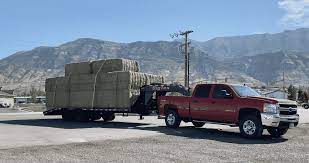What is Gross Combined Weight Rating (GCWR) and Why It's Important
You might not think that towing would have much to do with mathematics but you would be mistaken. There is definitely an aspect of math when it comes to safely and correctly pulling a load. One of the terms and values in this math is called Gross Combined Weight Rating or GCWR.
What Is Gross Combined Weight Rating?
The value Gross Combined Weight Rating or GCWR is the maximum allowable weight of the fully-loaded tow vehicle. This is the maximum that the vehicle can safely handle without putting your safety at risk. This value is set by the vehicle's manufacturers based on extensive testing.
You should be able to find the GCWR in the user manual of your vehicle but you can also very easily figure out this value yourself. Calculating GCWR is easy as you only need to add the Gross Vehicle Weight (GVW) and the Gross Trailer Weight (GTW). Combining these two values will give you a roughly accurate estimate of the total weight.

Adding GVW to GTW does not account for the trailer's tongue weight, cargo in the tow vehicle and passengers. It only accounts for the vehicle, trailer/load and a full tank of gas. So to get a perfect reading of the weight you have to factor in vehicle cargo and passengers. If you want to be exact you can take the whole set up to a public scale and weigh it.
If you feel confident the whole weight is well within the safety zone then weighing everything may not be needed but if you feel it might be close you should confirm the GCWR. If you need to remove weight before embarking on the towing project it is best to do so rather than risk damage and potential danger.
Why Is Gross Combined Weight Rating Important?
You might be wondering why GCWR is so important and the answer is very simple. Exceeding the GCWR when towing may put you at risk for a serious accident while driving. If you try to tow a load beyond the limit it becomes harder to control your tow vehicle. Making turns is more difficult and stopping safely is compromised.
If the trailer is too heavy you may not be able to pull it or it might not stop in time if you have to brake suddenly. Brakes are also rated for specific stresses so exceeding them can cause brake damage or failure.
Another important reason to keep GCWR in the safe range is that being overweight can cause damage to axles on both the trailer and the tow vehicle. This type of damage can be very expensive to repair and can leave you and your load stranded.
Conclusion
Gross Combined Weight Rating or GCWR is an important part of the towing mathematics equations. It is indicative of the total weight of a tow vehicle with the trailer and load. Each vehicle has a maximum rating that it can manage so knowing this value is important.
You do not want to be overloaded on your trailer as this can cause damage and be very dangerous to you and your passengers. So be aware of your vehicle's limitations and how much your prospective towing project weighs.
Link To or Reference This Page
We spend a lot of time collecting, cleaning, merging, and formatting the data that is shown on the site to be as useful to you as possible.
If you found the data or information on this page useful in your research, please use the tool below to properly cite or reference Tow Ratings as the source. We appreciate your support!
-
<a href="http://towratings.net/blog/what-is-gross-combined-weight-rating-gcwr-and-why-it-s-important/">What is Gross Combined Weight Rating (GCWR) and Why It's Important</a>
-
"What is Gross Combined Weight Rating (GCWR) and Why It's Important". Tow Ratings. Accessed on April 23, 2024. http://towratings.net/blog/what-is-gross-combined-weight-rating-gcwr-and-why-it-s-important/.
-
"What is Gross Combined Weight Rating (GCWR) and Why It's Important". Tow Ratings, http://towratings.net/blog/what-is-gross-combined-weight-rating-gcwr-and-why-it-s-important/. Accessed 23 April, 2024
-
What is Gross Combined Weight Rating (GCWR) and Why It's Important. Tow Ratings. Retrieved from http://towratings.net/blog/what-is-gross-combined-weight-rating-gcwr-and-why-it-s-important/.